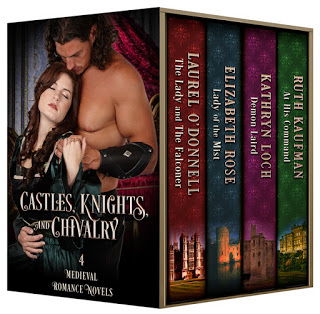I was pleasantly surprised and honored when Amazon best-selling author Laurel O’Donnell invited me to be part of a box set with her and two more best-sellers, Kathryn Loch and Elizabeth Rose. Thus, Castles, Knights and Chivalry was born!
What will you pay for books?
As an author, I’m always trying to grow my readership, and hope new readers of one book will buy the other and look forward to my next release. But as a newer author currently writing in perhaps not the most popular sub-genre, medievals, getting my books out there can be time consuming and costly.
What do you think the average self-published author earns a year (across all genres, not just romance)? Digital Book World says the median is $500-999 per year. Other sites, such as The Write Life, take a rosier view…but you have to pay attention to the source of the statistics and which books are included…in this case, 200,000 best-sellers.
I’m very fortunate to have exceeded $999 since my first book released January 14, 2015 (my second released April 14). However, despite my love of writing, I’m debating whether the time and effort are worth the rewards. Given the expenses of self-publishing (such as great editor(s), competitive cover(s), and any promotion or marketing), even earning back what you spent can be a challenge. And the sad reality is that many–probably most–authors will never get compensated for the hours they invested in creating each book.
Why? In my opinion, there are two key reasons:
1) The proliferation of online self-published books of all levels of quality plus many authors’ large backlists.
As of this writing, how many romances do you think are available for Kindle? 288,798. And 30,710 of those were released in the last 9 days.
2) The recent market devaluation of the cost of books in general.
Remember the days when you had to travel to an actual bookstore and shell out anywhere from $5.99 to $7.99 plus tax for a paperback? Now you can hop online and instantly download e-books…for free, a mere $.99, or from $1.99-4.99.
One site, k-lytics.com, reports that in April, 2015, the average price of romance Top 100 best sellers was $2.99. When you upload your book to Kindle Direct Press, Amazon presents a bell curve showing the price at which you have the best chance of selling the most books.
Most of us love a good sale and enjoy saving money. But many readers now feel even $2.99 is too much to pay for thousands of words the author labored over. Thanks to the proliferation of bargain and/or free book e-newsletters such as BookBub (the hardest to get your book accepted into, even at a cost of hundreds of dollars depending on your book’s genre), Bargain Booksy, and Choosy Bookworm to name just a few, readers can have access to dozens of free or discounted books every single day.
And there’s Kindle Owners’ Lending Library, via Amazon Prime, which allows members to download many books for free. Authors decide whether or not to place their books in the program, and get paid from a global pool of Amazon’s money each month. This is great, because of course authors get nothing for books taken out from traditional libraries. But for authors of novel-length books, the payment is usually less than they’d receive from an actual sale. And Amazon announced changes to the KOLL program starting in July, when payouts will be based on how many pages each KU/KOLL reader reads.
Here’s The Authors’ Guild’s take on the changes. There are dozens of posts claiming this will be a good or a bad thing for authors.
It’s great to have the opportunity to try a new author or a different sub-genre than you usually read for free or a low cost. But too much free, whether it’s temporary or permafree, IMO, devalues books in general and raises expectations of more free stuff. Will readers go and buy that new author’s next book, or wait for it to go on sale, too?
What do you think about book prices?
Do you accept advice?
When you’re trying to make an important decision, do you go it alone or solicit advice? Who do you trust to guide you? Are you willing to accept help…do you think it means you’re weak/less capable, or, as platitudes say, that doing so shows you’re strong?
Authors often have critique groups and/or beta readers to offer feedback. They may have an agent and/or an editor, or hire an editor who requests revisions.
Most actors also have agents, and many work with coaches and/or take classes. We often receive direction during auditions and while on set, and of course would be remiss not to follow that. The key is being able to adapt on the spot and do as advised. I’ve had the opportunity to sit on some auditions, and have been surprised when actors couldn’t or didn’t employ a simple correction in their next take, such as “smile more.” Once I took classes I’d heard from many reliable sources were beneficial, but I ended up more confused than when I began, and it took some time to unlearn that approach and move forward with trusting my choices.
Some might ignore great advice to their peril, or accept some that either wasn’t good or doesn’t turn out as well as they hope it will. Others are fortunate to have someone in their life with a great track record of providing helpful advice.
Writing decisions: I had two editors take different approaches with my next book. When both suggest the same change, such as adding another scene to enhance the subplot, I’m more inclined to follow it. When only one suggests something, I might do it if I agree. Yet there’s a nagging doubt if I pass on something else. What if she’s right, and I need to do that, too?
Acting decisions: I recently took new headshots, and am receiving feedback on which to use for my commercial and TV/film pictures. If I change my mind, of course I can use different pictures or get more taken at a later date, but what I choose to post on casting sites and have my agent submit can impact future auditions and work. I’m also taking an on-camera class and some private coaching, and am assimilating everything.
What’s challenging is trusting myself to know which advice to follow. And believe I can do it well, so I can keep learning and improving.
100 Amazon Gift Cards & Kindle Countdown Deal
 Enter at: https://www.nightowlreviews.com/v5/Blog/Articles/Find-Your-Next-Great-Read-Scavenger-Hunt-June-2015.
Enter at: https://www.nightowlreviews.com/v5/Blog/Articles/Find-Your-Next-Great-Read-Scavenger-Hunt-June-2015.
Finally, an announcement is coming soon about a July opportunity.
Thank you for stopping by and for your interest in my books.
What makes you laugh?
 |
| I’ll be participating in this event! |
What makes you laugh in general? What sparks you to laughter when you’re reading a book?
Why do YOU read historical romance? Join us tomorrow, 5/29.
I’m honored to be a Historical Romance Network author along with some of my favorite historical authors, including Madeline Hunter and Jo Beverley.
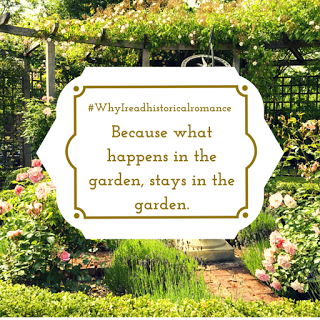 We hope you’ll join HRN authors and historical romance readers across the world tomorrow, May 29, on Facebook, Twitter or Tumblr for #WhyIReadHistoricals day. Authors will share why they wrote or read certain historical romances, or why we write/read them in general.
We hope you’ll join HRN authors and historical romance readers across the world tomorrow, May 29, on Facebook, Twitter or Tumblr for #WhyIReadHistoricals day. Authors will share why they wrote or read certain historical romances, or why we write/read them in general.
And we want to know why you read historical romance. What draws you to books set in other time periods? Which do you prefer, and why? Which historicals are on your keeper shelf? Are you drawn to alpha heroes and kilts? Pirates? Dukes, rakes and women on the shelf? Knights with swords and castles? Settings in countries other than England and Scotland?
Who are your favorite authors, and why?
What prompts you to try a new-to-you author: covers, blurbs, reviews, time period, or something else?
My favorite historicals are medievals, which is why I write them. Some of my favorite keeper shelf books are by Kathleen Woodiwiss (The Wolf and the Dove), Roberta Gellis (Alinor: Roselynde Chronicles Book 2), Madeline Hunter (By Design), Julie Garwood (Honor’s Splendour) and Judith McNaught (Kingdom of Dreams).
Thanks to HRN member Kris Kennedy, who was instrumental in putting this together.
The Waiting Game
Both as an actor and an author, moving forward often depends on others getting back to me. Or not.
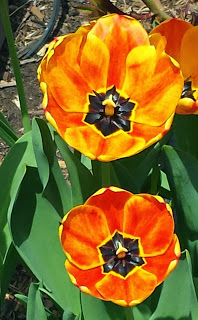
For example, I had an audition yesterday for a TV commercial. The callback isn’t until June 1st. I’ll only hear something if I get a callback, but I have no idea when that information might arrive. So how long do I hold the day and the day for the shoot open, just in case?
Often when I have a shoot, the call time doesn’t come until late the day before. or even that evening. If it’s super early, say 6am, I might prefer not to have plans the night before. And sometimes I end up having more time than planned: I was waiting for a call time for something yesterday, but learned late in the afternoon the shoot had been postponed….but they won’t know when until next week.
When I send projects to my copy editor, obviously I can’t make changes and release the next book until she finishes making her comments. Clients who want to book me for a voiceover job but don’t have a final script have to wait until they do before I can get it and record.
 Though I can move on to something else, it’s a challenge to budget time when I don’t know what may be incoming on a given day. One solution is to cross as many items off my list as possible each day, such as completing VO jobs as soon as they come in. That way I don’t have huge obligations stagnating on my plate as the due date approaches and can make room for things that pop up on short notice. Plus, clients often praise my speedy turnaround.
Though I can move on to something else, it’s a challenge to budget time when I don’t know what may be incoming on a given day. One solution is to cross as many items off my list as possible each day, such as completing VO jobs as soon as they come in. That way I don’t have huge obligations stagnating on my plate as the due date approaches and can make room for things that pop up on short notice. Plus, clients often praise my speedy turnaround.
Waiting used to be frustrating. Instead, I’m making an effort to live more in the moment by focusing on what I’m doing and not where I’ll be or what I need to do later. By taking walks when the weather is nice and taking pictures like these.
Series and/or standalone books?
Series seem to be especially popular these days. Most involve connected characters, where, for example, book 2 is book 1’s heroine’s sister’s story. Or all books may be set in a fictitious small town, with each book focusing on different residents while incorporating the same cast of secondary characters and what become familiar locations. Another theme is small groups, in which each member of a book club, firefighters working at the same firehouse (Kate Meader’s Hot in Chicago series), or a large family getting his/her own story.
Authors often say that so-and-so character cried out for his/her own story, or that readers requested it. Some series involve three books while others span many more (Julie Ann Walker’s Black Knights is coming up on eight…so far). Some authors become known for their series. When you search popular bestselling author Debbie Macomber on Google, the first thing that comes up is her Cedar Cove series, then her Blossom Street and Heart of Texas series. 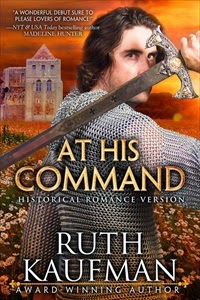 I decided to try something a little different with my first series. Wars of the Roses Brides is time-based rather than character-based, and set during what we now call the Wars of the Roses. The first, my January release AT HIS COMMAND, takes place in 1453 England, FOLLOW YOUR HEART, the second, released in April, is in 1460, and the next (releasing this summer, working title: THE BETTER BRIDE…cover coming soon!) is in 1462. Each one is a standalone, meaning you don’t have to read #1 to understand #2 or #3. My heroes and heroines are different in each book and unrelated.
I decided to try something a little different with my first series. Wars of the Roses Brides is time-based rather than character-based, and set during what we now call the Wars of the Roses. The first, my January release AT HIS COMMAND, takes place in 1453 England, FOLLOW YOUR HEART, the second, released in April, is in 1460, and the next (releasing this summer, working title: THE BETTER BRIDE…cover coming soon!) is in 1462. Each one is a standalone, meaning you don’t have to read #1 to understand #2 or #3. My heroes and heroines are different in each book and unrelated. 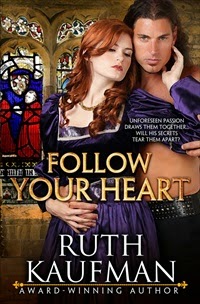 If you choose to read the books in order, you’d gain an overview of late medieval England life and historical events as seen through the eyes and experiences of the couples, their families and friends. The connected characters appearing in some or all of the books are actual historical figures, including kings, queens and dukes. The volatile disputes between the House of York and House of Lancaster over who should rule, politics and actual battles feature prominently.
If you choose to read the books in order, you’d gain an overview of late medieval England life and historical events as seen through the eyes and experiences of the couples, their families and friends. The connected characters appearing in some or all of the books are actual historical figures, including kings, queens and dukes. The volatile disputes between the House of York and House of Lancaster over who should rule, politics and actual battles feature prominently.
Significant research was required to ensure (as much as possible given that these are novels) that the king and other nobles were in the right place at the actual times depicted, just as a small town series author needs to make sure that the town map remains consistent.
Do you seek out series? If so, what elements do you look for? Can there be too many books in a series…or do you still enjoy each new story? I ask because I’m pondering a series that could have as many as a dozen books….
So you want to write a book? Start today!
I often meet people who say they want to write a book or have been working on one for a long time. I say, “What are you waiting for? Why don’t you start (or finish)?” They hem and haw, “Well, blah blah blah, this or that excuse.”
If you’re not sure where to begin, write down your ideas. What genre do you want to write–mystery, romance, thriller, or __________? Familiarize yourself with the bestsellers in your market. Consider taking an online workshop, class, or reading a book or two about writing books. I recommend Dwight Swain’s Techniques of the Selling Writer and Debra Dixon’s GMC: Goal, Motivation, and Conflict.
Is there any research you need to do before writing–is your protagonist a cop, lawyer, wizard, knight, but you lack knowledge of job specifics? If so, make sure you don’t dwell too long on learning about writing and research and call that “writing.” That was a mistake I made when I first started…since I write medievals, I’d spend hours perusing books on the 15th century. It took hearing Catherine Coulter say in a speech at an RWA Conference that only new pages counted as writing to spark me to set weekly page/word count goals.
Make a list of next steps. Create a writing schedule and make appointments with yourself so you don’t keep putting it off.
I bet you’ll feel good about making progress, and might even be motivated to do more. Wanting something that’s in your control but not taking action can weigh on you.
Happy writing!
What to release next…decisions, decisions
Follow Your Heart received a great review from USATODAY.com (yay!), and has garnered wonderful reviews on Amazon and Goodreads. Publishers Weekly is considering it for review via BookLife, which could go either way. But these days most authors can’t rest on any laurels and need to keep producing books for their readers.
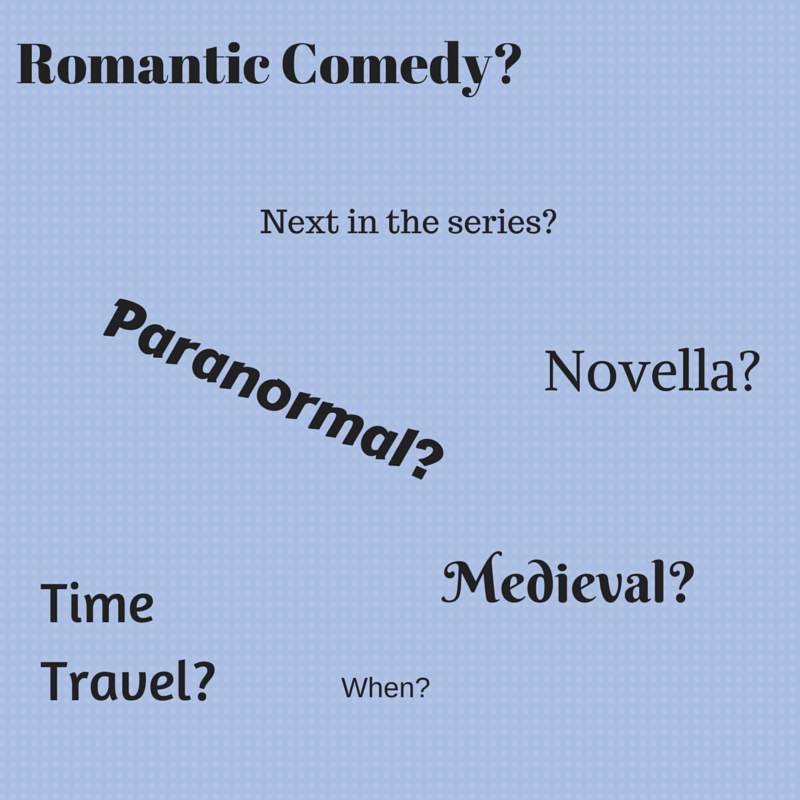 The questions are, what kind, what length, and with what frequency?
The questions are, what kind, what length, and with what frequency?
I’ve been toying with the idea of writing a novella or an entire book telling Joanna from FYH’s half-sister Margery’s story, in part because I’ve had feedback that she’s an interesting character and because I love the time period and setting. I have another medieval ready to go, and manuscripts in other genres from a medieval paranormal I’d like to create a series around to a humorous women’s fiction that has a romantic comedy sequel. I’m particularly fond of a paranormal time travel to Elizabethan England that I think also has series potential….
Plus I have a partial of a romantic comedy I really want to finish…at least once a week something reminds me of the premise and urges me to get back to it. Yet much advice steers newer authors against genre hopping so readers know what to expect. Will readers follow if I release in multiple genres?
I see a lot of other advice that every three months is a good new release time period. On the other hand, I don’t want to overwhelm potential readers. And obviously new content takes longer to create for most of us. I don’t want to over think the process and become stymied, but at the moment my gut doesn’t feel clear enough to trust so I can move forward.
A good thing about self-publishing is that you can try whatever you want whenever you want. If it doesn’t work, you can try something different. But you can’t reclaim the time and money invested, and so want to make the most productive decisions possible.
I’m going to set a goal: I’ll review all of my options, and narrow them down to the top three over the weekend. Then one week from today, I’ll make a decision. There. I feel better already!

